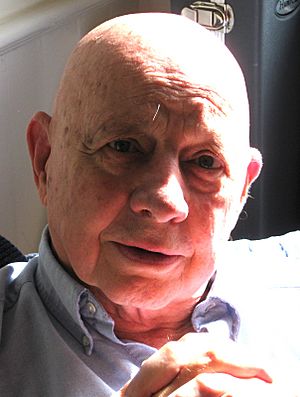James G. March facts for kids
Quick facts for kids
James G. March
|
|
|---|---|
 |
|
| Born | January 15, 1928 Cleveland, Ohio, U.S.
|
| Died | September 27, 2018 (aged 90) |
| Alma mater | Yale University |
| Scientific career | |
| Fields | Political science, organization theory |
| Institutions | Carnegie Institute of Technology University of California, Irvine Stanford University |
| Influences | Herbert A. Simon |
James Gardner March (January 15, 1928 – September 27, 2018) was an American political scientist, sociologist, and economist. A professor at Stanford University in the Stanford Graduate School of Business and Stanford Graduate School of Education, he is best known for his research on organizations, his (jointly with Richard Cyert) seminal work on A Behavioral Theory of the Firm, and the organizational decision making model known as the Garbage Can Model.
Early life and education
Born in Cleveland, Ohio in 1928, March received his B.A. from the University of Wisconsin at Madison in 1945 in political science. He received his M.A. in 1950 and Ph.D. in 1953 from Yale University, both in political science.
James March was awarded honorary doctorate from numerous universities:
- Copenhagen Business School (then: Copenhagen School of Economics), 1978
- Hanken School of Economics (Helsinki), 1979
- University of Wisconsin-Milwaukee, 1980
- University of Bergen, 1980; (Economics)
- Uppsala University, 1987; (EkDhc, Faculty of Social Sciences)
- Helsinki School of Economics, 1991
- Dublin City University, 1994; (Economics)
- Göteborg University, 1998
- University of Poitiers, 2001
- University of Trento, 2000
- University of Southern Denmark, 2003
- Budapest University of Economics, 2003
- York University (Toronto), 2007
- Hautes Etudes Commerciales (HEC Paris), 2007
- Ramon Llull University (Barcelona), 2007
- Lappeenranta (Finland) University of Technology, 2008
- Stockholm (Sweden) Stockholm School of Economics, 2009
Career
From 1953 to 1964, he had served on the faculties of the Carnegie Institute of Technology as a senior research fellow and assistant professor, and later professor of industrial administration and psychology.
From 1964 to 1970, March joined the faculty at the University of California, Irvine as the founding Dean of the School of Social Sciences (1964–69). He was also a professor of psychology and sociology.
In 1970 March moved to Stanford University, where he was professor emeritus. During his time at Stanford, he had held several titles, including professor of political science and sociology, David Jacks Professor of Higher Education (1970–1978), professor of management (1978–1979), Fred H. Merrill Professor of Management (1979–1992), Jack Steele Parker Professor of International Management (1992–present). He had also served as a senior fellow at the Hoover Institution (1978–1987) and the founding director of the Scandinavian Consortium for Organizational Research (Scancor) (1989–1999).
He had been elected to the National Academy of Sciences, the American Academy of Arts and Sciences, the American Philosophical Society, and the National Academy of Education, and had been a member of the National Science Board. He was a member of the Royal Swedish Academy of Sciences and the Norwegian Academy of Science and Letters.
He interacted and communicated in many different forms as books, articles, interactive seminars, films and poetry.
Contributions
March was highly respected for his broad theoretical perspective which combined theories from psychology and other behavioural sciences. As a core member of the Carnegie School, he collaborated with the cognitive psychologist Herbert A. Simon on several works on organization theory.
March was also known for his seminal work on the behavioural perspective on the theory of the firm along with Richard Cyert (1963).
In 1972, March worked together with Johan Olsen and Michael D. Cohen on the systemic-anarchic perspective of organizational decision making known as the Garbage Can Model.
The scope of his academic work was broad but focused on understanding how decisions happen in individuals, groups, organizations, companies and society. He explores factors that influences decision making, such as risk orientation, leadership and the ambiguity of the present and the past; politics and vested interests by stakeholders; the challenges of giving and receiving advice; the challenges of organizational and individual learning and the challenges of balancing exploration and exploitation in organizations.
Awards
March received numerous awards, including:
- 1968 Wilbur Lucius Cross Medal, Yale University
- 1984 Scholarly Contributions to Management Award (Irwin Award), Academy of Management
- 1995 Walter J. Gores Award for Excellence in Teaching, Stanford University
- 1997 John Gaus Award from the American Political Science Association
- OMT Distinguished Scholar Award, Academy of Management
- 2004 Viipuri Prize, Viipuri School of Economics
- 2004 Aaron Wildavsky Enduring Contribution Award, American Political Science Association
- 2005 Herbert A. Simon Award, Budapest University of Economics
- 2016 Progress Medal from the Society for Progress
Personal
James March was the father of four children and a grandfather. He died on September 27, 2018, aged 90.
See also
 In Spanish: James Gary March para niños
In Spanish: James Gary March para niños

